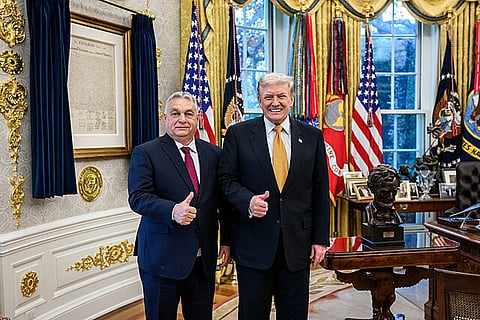

Hungary has announced it secured an indefinite waiver from U.S. sanctions on Russian energy imports, a claim that appears to be at odds with the White House's position of a one-year exemption. The agreement, reached during a meeting between Prime Minister Viktor Orban and President Donald Trump, highlights Hungary's critical dependence on Russian energy and the complex geopolitics surrounding sanctions policy .
Following high-level talks at the White House, Hungarian and U.S. officials presented different interpretations of the agreed-upon sanctions waiver.
The Hungarian government insists it obtained a permanent reprieve. Foreign Minister Peter Szijjarto stated on Facebook that there would be no sanctions on oil and gas shipments to Hungary "for an indefinite period," a point later reinforced by Prime Minister Orban himself . They emphasized that the exemption covers energy imports via the key TurkStream gas pipeline and the Druzhba oil pipeline .
In contrast, the White House has consistently described the exemption as temporary. A White House official clarified to Reuters that the waiver is for one year only. As part of the arrangement, Hungary has also committed to diversifying its energy purchases by buying U.S. liquefied natural gas (LNG) in contracts valued at approximately $600 million .
The urgency for a waiver stems from Hungary's profound reliance on Russian energy, which has persisted since the start of the conflict in Ukraine . International Monetary Fund data from 2024 shows that Hungary sourced 74% of its gas and 86% of its oil from Russia . This reliance has drawn criticism from other European Union and NATO allies .
Prime Minister Orban argued that without this agreement, Hungary would have faced severe economic consequences, including surging energy costs, increased unemployment, and "unbearable" price rises for households and firms . The IMF has warned that an EU-wide cutoff of Russian natural gas could cost Hungary more than 4% of its GDP . This heavy dependence is partly due to Hungary's landlocked geography and the fact that its domestic refineries are specifically configured to process Russian Urals crude oil .
This development occurs within a complex web of international relations and energy politics. The Trump administration had previously imposed sanctions on Russian oil giants Lukoil and Rosneft, threatening secondary sanctions against their buyers . The decision to grant Hungary a waiver has raised questions about the uniformity of enforcing these sanctions. Analysts warn that providing special treatment for an ally could encourage other nations to seek similar exemptions, potentially eroding the economic pressure on Russia .
Hungary and neighboring Slovakia are now the only EU countries still receiving Russian oil via pipeline, having deepened their dependence despite an EU-wide effort to phase out Russian energy . Orban's government has also opposed the European Commission's plan to ban all Russian gas imports by 2028 . The meeting also touched upon broader diplomacy, including previously discussed plans for a potential Trump-Putin summit in Budapest, which was shelved after Russia rejected a ceasefire .